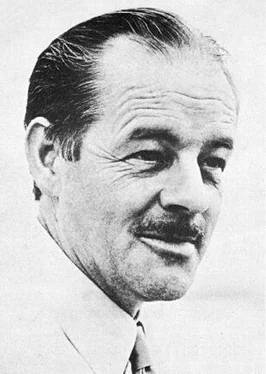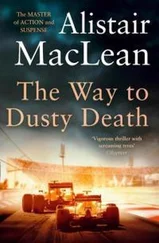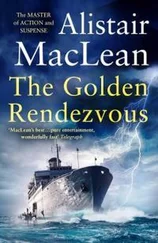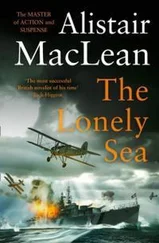At exactly seventy-six fathoms our searchlights picked up the bed of the sea. No rock or coral or sponge bars here, just little patches of greyish sand and long black stretches of mud. I started the two motors again, advanced them almost to half speed, trimmed the planes and began to creep forward very slowly indeed. We had to move only five yards. Bryson’s estimate had been almost exactly right; with 625 metres showing on the tow-wire indicator I caught a glimpse of something thrusting up from the bed of the sea, almost out of our line of vision to the left. It was the tailplane of an aircraft, we had overshot our target to the right, the nose of the plane was pointing back in the direction from which we had come … I put the motors in reverse, started up the tow-wire drum, backed about twenty yards then came forward again, angling to the left. Arrived at what I judged to be the right spot, I put the motors momentarily into reverse, then cut them out altogether. Slowly, surely, the bathyscaphe began to sink: the dangling guide rope touched bottom, but this lessening of weight failed to overcome the slight degree of negative buoyancy as it should have done, and the base of the observation chamber sank heavily into the black mud of the ocean floor.
Only fifteen minutes had elapsed since I’d turned down the intake control of the carbon monoxide absorption unit but already the air in the cabin was growing foul. Neither Vyland nor Royale seemed to be affected; maybe they thought that that was the normal atmospheric condition, but they probably didn’t even notice it. Both of them were completely absorbed in what could be seen, brightly illuminated by the for’ard searchlight, through our for’ard observation window.
I was absorbed in it myself, God only knew. A hundred times I had wondered how I’d feel, how I’d react when I finally saw, if ever I saw, what was lying half-buried in the mud outside. Anger I had expected, anger and fury and horror and heartbreak and maybe more than a little of fear. But there was none of those things in me, not any more, I was aware only of pity and sadness, of the most abysmal melancholy I had ever known. Maybe my reactions were not what I had expected because my mind was befogged by the swirling mists of pain, but I knew it wasn’t that: and it made things no better to know that the pity and the melancholy were no longer for others but for myself, melancholy for the memories that were all I would ever have, the pity a self-pity of a man irretrievably lost in his loneliness.
The plane had sunk about four feet into the mud. The right wing had vanished – it must have broken off on impact with the water. The left wing-tip was gone, but the tail unit and fuselage were still completely intact except for the riddled nose, the starred and broken glass that showed how the DC had died. We were close up to the fuselage, the bow of the bathyscaphe was overhanging the sunken cabin of the plane and the observation chamber no more than six feet distant from those shattered windows and almost on the same level. Behind the smashed windscreens I could see two skeletons: the one in the captain’s seat was still upright, leaning against the broken side window and held in position by the seat belt, the one in the co-pilot’s seat was bent far over forward and almost out of sight.
‘Wonderful, eh, Talbot? Isn’t that just something?’ Vyland, his claustrophobic fear in momentary abeyance, was actually rubbing his hands together. ‘After all this time – but it’s been worth it, it’s been worth it! And intact, too! I was scared it might have been scattered all over the floor of the sea. Should be no bother for an experienced salvage man like yourself, eh, Talbot?’ He didn’t wait for an answer but turned away immediately to stare out of the window and gloat. ‘Wonderful,’ he repeated again. ‘Just wonderful.’
‘It’s wonderful,’ I agreed. I was surprised at the steadiness, the indifference in my own voice. ‘With the exception of the British frigate De Braak , sunk in a storm off the Delaware coast in 1798, it’s probably the biggest underwater treasure in the western hemisphere. Ten million, two hundred and fifty thousand dollars in gold specie, emeralds and uncut diamonds.’
‘Yes, sir.’ Vyland had forgotten he was an urbane top executive and he was back at the hand-washing again. ‘Ten million, two hundred and–’ His voice trailed off slowly, faltered to a stop. ‘How – how did you know that, Talbot?’ he whispered.
‘I knew it before you ever heard of it, Vyland,’ I said quietly. Both of them had turned away from the window and were staring at me, Vyland with a mixture of puzzlement, suspicion and the beginnings of fear, Royale with his one good, cold, flat, marbled eye wider than I had ever seen it. ‘You’re not quite so smart as the general, I’m afraid, Vyland. Neither am I for that matter. He caught on to me this morning, Vyland. I’ve worked out why. Do you know why, Vyland? Do you want to know why?’
‘What are you talking about?’ he demanded hoarsely.
‘He’s smart, is the general.’ I went on as if I hadn’t heard the interruption. ‘He saw when we landed on the rig this morning that I only hid my face until I was certain that a certain person wasn’t among the reception committee and that then I didn’t bother any longer. Careless of me, I admit. But that tipped him off to the fact that I wasn’t a murderer – if I were I’d have hidden my face from everybody – and it also tipped him off to the fact that I had been out on the rig before and was frightened someone there would recognize me. He was right on both counts – I wasn’t a murderer, and I had been out on the rig before. In the early hours of this morning.’
Vyland had nothing to say, the shattering effect of my words, the limitless avenues of dark possibilities they were opening up had him completely off balance, too confused even to begin to put his conflicting thoughts into words.
‘And the general noticed something else,’ I went on. ‘He noticed that when you were telling me about this salvage job that I never once asked the first, the most obvious question in the world – what was the treasure to be salvaged, what kind of vessel or aircraft the treasure was in, if any. I never once asked one of those questions, did I, Vyland? Again careless of me, wasn’t it, Vyland? But you never noticed. But General Ruthven noticed, and he knew there could only be one answer – I already knew.’
There was a pause of perhaps ten seconds, then Vyland whispered: ‘Who are you, Talbot?’
‘No friend of yours, Vyland.’ I smiled at him, as near as my aching upper jaw would allow. ‘You’re going to die, Vyland, you’re going to die in agony and you’re going to use your last breath on earth cursing my name and the day you ever met me.’
Another silence, deeper even than the one that had gone before. I wished I could smoke, but it was impossible inside that cabin, and heaven only knew the air there was foul enough already, our breathing was already unnaturally quickened, and sweat was beginning to trickle down our faces.
‘Let me tell you a little story,’ I went on. ‘It’s not a fairy story but we’ll start it with “Once upon a time” for all that.
‘Once upon a time there was a certain country with a very small navy – a couple of destroyers, a frigate, a gunboat. Not much of a navy, is it, Vyland? So the rulers decided to double it. They were doing pretty well in the petroleum and coffee export markets, and they thought they could afford it. Mind you, they could have spent the money in a hundred more profitable ways but this was a country much given to revolution and the strength of any current government largely depended on the strength of the armed forces under their control. Let’s double our navy, they said. Who said, Vyland?’
Читать дальше
Конец ознакомительного отрывка
Купить книгу












